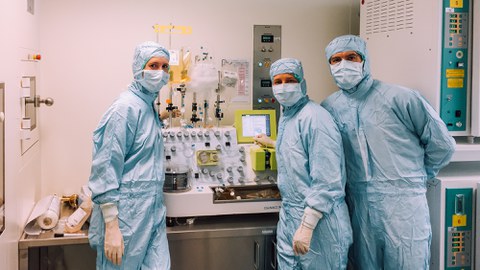Mar 16, 2023
Life-Saving Cell Therapies From Just Across the Street: CRTD Becomes Production Site for Virus-Specific T Cells for the University Hospital

Dr. Anke Fuchs (left) and colleagues at the GMP Facility with the machine used for producing the virus-specific T-cells.
The Center for Regenerative Therapies Dresden (CRTD) of TU Dresden became a production site for cell therapy against severe cases of viral infections thanks to a new manufacturing license granted to the University Hospital Carl Gustav Carus. The CRTD is now the first production site for virus-specific T cells in eastern Germany. The cells will provide an important treatment for patients at the University Hospital.
Stem cell transplantation is a well-established treatment for patients with blood cancers. The transplant helps replace the patient’s original immune system with a new immune system derived from stem cells of a matched healthy donor. This leaves the patients highly susceptible to infection until the new immune system is fully developed. Viral infections with cytomegalovirus (CMV), Epstein-Barr virus (EBV), and adenovirus (ADV) are common complications that can often be fatal for these patients. Conventional antiviral drugs often fail to combat the infection and carry high toxicity which limits their use in patients weakened by previous treatments and children who have undergone stem cell transplantation. Cell therapy, which uses virus-specific T cells from healthy donors who have previously been exposed to CMV, EBV, and ADV and generated an immune response, provides a last line of defense for these patients.
T cells are highly specialized immune cells that can recognize and fight very specific threats. “They are the immune systems’ special forces. By supplying the patients with selected T cells from the blood of donors, we can make sure that their immune systems can respond to the virus fast and overcome the infection,” says Dr. Anke Fuchs, research group leader at the CRTD, research fellow at the Mildred Scheel Early Career Center (MSNZ), and head of quality control at the CRTD’s Good Manufacturing Practice (GMP) Facility.
“The procedure for isolating and preparing the cells, now implemented at the CRTD, is a fully automated and standardized 12-hour process. Blood donation is mixed with synthetic particles mimicking viral structures. The specific T cells then get activated and can be detected and enriched with magnetic antibodies. This allows quick and efficient preparation of virus-specific T cells,” adds Dr. Fuchs. As a result, a sterile, sealed infusion bag containing life-saving cells is brought directly to the patient’s bedside.
The University Hospital Carl Gustav Carus, which performs about 100 allogeneic stem cell transplantations per year, will now be able to respond more quickly to viral infections in these patients. “The possibility of preparing the virus-specific cell therapies across the street in the CRTD allows us to act even faster than before and gain decisive time for the patient,” says Prof. Dr. med. Martin Bornhäuser, director of the Medical Clinic and Polyclinic I of the University Hospital Carl Gustav Carus.
The new manufacturing license allows the University Hospital Carl Gustav Carus to become one of the sites in the ongoing TRACE clinical trial. TRansfer of Adenovirus, Cytomegalovirus, and Epstein-Barr virus-specific T cells (TRACE) is the first multinational phase III clinical trial to prove the efficacy and safety of using virus-specific T cells in children and adults undergoing stem cell transplantation. The trial is an important step toward to establishing T cell therapy as a standard treatment for drug-resistant viral infections.
About GMP Facility
The Good Manufacturing Practices Facility (GMP) at the Center for Regenerative Therapies Dresden (CRTD) is a technology platform producing cellular therapeutics. The facility's aim is to provide internal and external users a broad range of services based on its long-standing and diverse expertise in the development, manufacture and therapeutic use of advanced-therapy medicinal products (ATMP) and tissue engineering products (TEP) and their regulatory drug approval.
